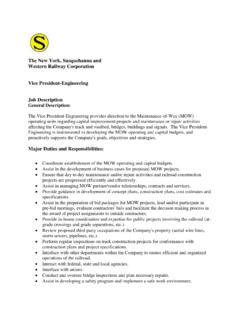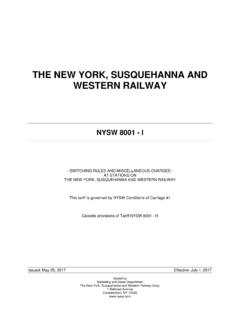Transcription of WATER USE AND WATER RIGHTS IN PENNSYLVANIA
1 WATER USE AND WATER RIGHTS IN PENNSYLVANIA A Status Report from the League of Women Voters of PENNSYLVANIA Citizen Education Fund Common Ground Project on: " WATER Resources Management for PENNSYLVANIA s Future" 1998 League of Women Voters of PENNSYLVANIA Citizen Education Fund Table of Contents Introduction .. WATER Law in PENNSYLVANIA .. Public Trust Doctrine Surface WATER vs. Groundwater RIGHTS Riparian Systems vs.
2 Appropriative Systems Consumptive Use vs. Nonconsumptive Use Existing WATER Laws in PA Responsibility for Overseeing WATER Use in PA .. River Basin Commissions Department of Environmental Protection Fish and Boat Commission Other Agencies Problems/Gaps in PA s Riparian System .. WATER RIGHTS Guarantees Competing Uses WATER Demand WATER Conservation Droughts Options and Consequences.
3 Riparian, Prior Appropriation and Regulated Riparian Systems State and Regional Options Watershed-based WATER Supply Planning Model State WATER Code (eastern states) What Other States Are Doing No Change in Current PA System Future Demands for WATER Use in PA .. WATER RIGHTS and WATER Use a Top Priority .. Conclusions and Summary .. Appendix .. WATER USE AND WATER RIGHTS IN PENNSYLVANIA A Status Report from the League of Women Voters-Citizen Education Fund Common Ground Project on: " WATER Resources Management for PENNSYLVANIA s Future Introduction In 1995 the LWVPA-CEF initiated a Common Ground Project on WATER Resources Management in PENNSYLVANIA .
4 The project brought together a broad range of stakeholders to assess the need for improving our laws and policies related to WATER use in the Commonwealth. Prior to a project conference in September 1995, eight work groups were formed to discuss and prepare reports on the following topics: Goals and Objectives of WATER Resources Management in PENNSYLVANIA Permitting and Registration of WATER Withdrawals Consumptive Use/Nonconsumptive Use and Drought Management Conservation and Efficient Use of WATER Instream Flow Needs Integration of All WATER Programs Federal.
5 State & Local Interbasin/Interstate Transfers and WATER Supply Planning for Future Needs WATER Resources and Land Use Planning The "Pre-Conference Report" and a "Summary of the Conference Proceedings" are available from LWVPA-CEF. Following the conference several regional meetings were held to gather viewpoints about the needs of differing geographical areas: the Upper & Lower Susquehanna Basins the Upper & Lower Delaware Basins This paper is an update on developments in WATER policy on the state and regional level since 1995.
6 One of the most significant has been the promotion of a watershed approach to WATER quality and quantity management by both EPA and DEP. There is renewed interest in watersheds at local levels as evidenced by the formation of new watershed organizations and the growth of volunteer WATER quality monitoring to supplement monitoring done by agencies. The need for integration of WATER policies, programs and plans is becoming more evident as more accurate assessments of needs and future demands are made known. WATER Law in PENNSYLVANIA Public Trust Doctrine The Constitution of the Commonwealth of PENNSYLVANIA , Article I, Section 27 states, " PENNSYLVANIA s public natural resources are the common property of all the people, including generations yet to come.
7 As trustee of these resources, the Commonwealth shall conserve and maintain them for the benefit of all the people." The adoption of Article I, Section 27, the Environmental RIGHTS Amendment to the PA Constitution, in 1971 represents the culmination of a major change in attitude about the use and exploitation of natural resources. At the time the Commonwealth was founded, natural resources were abundant and seemingly inexhaustible. After two hundred years of population growth and industrial development, it became evident that unrestricted use of natural resources, while creating wealth and prosperity for some, had created many problems and environmental damage that would adversely affect future generations.
8 The Environmental Amendment makes it clear that the Commonwealth is the trustee of PENNSYLVANIA s public natural resources and must conserve them for the benefit of all the people. WATER is a public natural resource that is required for the life and health of every person, a "vital resource." The "waters of the Commonwealth" are held in public trust by the Commonwealth. The right to "use" those waters is 1 conferred by the state through a common law system of riparian RIGHTS . There are rules covering different classifications of waters and WATER use in PENNSYLVANIA : Surface WATER vs.
9 Groundwater RIGHTS Riparian Doctrine for the use of WATER in streams: Each landowner adjacent to a stream can withdraw unlimited amounts of WATER for domestic use and reasonable extraordinary use on the property. Use of the WATER off the riparian property is considered "unreasonable per se." American Rule for withdrawal of groundwater: A landowner can withdraw percolating groundwater for natural and ordinary uses on that land regardless of effect on neighbors. There is no security of WATER RIGHTS under such a principle, , "the deepest well and the most powerful pump wins.
10 " Municipal WATER Supplies: Riparian common law views transfer of WATER as "unreasonable per se." However, court decisions have said that municipalities should not be prohibited from withdrawing WATER from outside their boundaries, but replacement of supplies affected by that withdrawal may be required. Riparian vs Prior Appropriation Systems Most of the states east of the Mississippi River have riparian systems of WATER RIGHTS based on English common law, interpreted and modified by court decisions. Historically, under common law, riparian doctrine said that unlimited reasonable use on the property was allowed, but that any use off the property was considered unreasonable per se.





